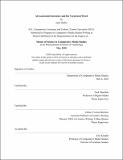| dc.contributor.advisor | Nick Montfort. | en_US |
| dc.contributor.author | Heflin, Judy(Judy Ann) | en_US |
| dc.contributor.other | Massachusetts Institute of Technology. Department of Comparative Media Studies. | en_US |
| dc.date.accessioned | 2020-09-15T22:03:54Z | |
| dc.date.available | 2020-09-15T22:03:54Z | |
| dc.date.copyright | 2020 | en_US |
| dc.date.issued | 2020 | en_US |
| dc.identifier.uri | https://hdl.handle.net/1721.1/127563 | |
| dc.description | Thesis: S.M. in Comparative Media Studies, Massachusetts Institute of Technology, Department of Comparative Media Studies/Writing, May, 2020 | en_US |
| dc.description | Cataloged from the official PDF of thesis. | en_US |
| dc.description | Includes bibliographical references (pages 139-146). | en_US |
| dc.description.abstract | This thesis focuses on contemporary AI-generated literature that has been traditionally published in the form of a printed book, labeled and interpreted as something written by "artificial intelligence," and that necessarily depends on vector representations of linguistic data. This thesis argues that AI-generated literature is not a monolithic practice that erases the role of the author, but rather encompasses a diversity of practice that includes divergent artistic and writerly perspectives. Through an in-depth look at three books of contemporary AI-generated literature and discussions with their human authors, this thesis details the authorial and writerly labor throughout the stages of datafication, vectorization, generation, and pagination in order to categorize the writerly practices that are involved in the creation of this type of work. This thesis also considers how these practices are preceded by "analog" types of writing, compares divergent authorial perspectives, and discusses ways of reading AI-generated literature, including a material analysis of how AI-generated text interacts with the printed book, how authors and publishers use paratextual elements to guide readings, along with additional points of entry for analyzing literary AI-generated texts. | en_US |
| dc.description.statementofresponsibility | by Judy Heflin. | en_US |
| dc.format.extent | 146 pages | en_US |
| dc.language.iso | eng | en_US |
| dc.publisher | Massachusetts Institute of Technology | en_US |
| dc.rights | MIT theses may be protected by copyright. Please reuse MIT thesis content according to the MIT Libraries Permissions Policy, which is available through the URL provided. | en_US |
| dc.rights.uri | http://dspace.mit.edu/handle/1721.1/7582 | en_US |
| dc.subject | Comparative Media Studies. | en_US |
| dc.title | AI-generated literature and the vectorized Word | en_US |
| dc.type | Thesis | en_US |
| dc.description.degree | S.M. in Comparative Media Studies | en_US |
| dc.contributor.department | Massachusetts Institute of Technology. Program in Comparative Media Studies/Writing | |
| dc.identifier.oclc | 1193319920 | en_US |
| dc.description.collection | S.M.inComparativeMediaStudies Massachusetts Institute of Technology, Department of Comparative Media Studies/Writing | en_US |
| dspace.imported | 2020-09-15T22:03:53Z | en_US |
| mit.thesis.degree | Master | en_US |
| mit.thesis.department | CMS | en_US |
